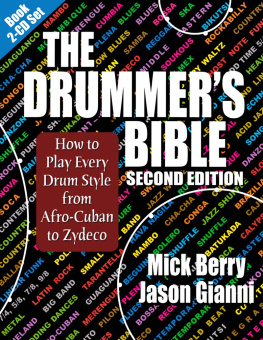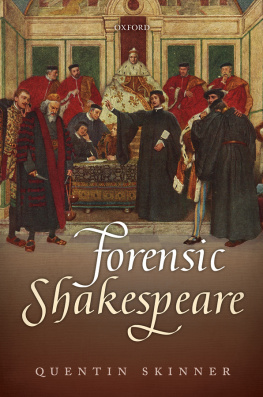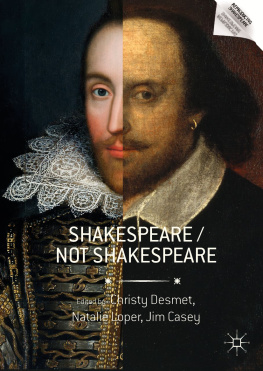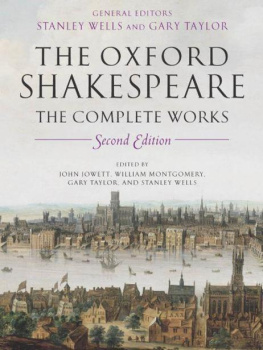Berry - Changing Styles in Shakespeare
Here you can read online Berry - Changing Styles in Shakespeare full text of the book (entire story) in english for free. Download pdf and epub, get meaning, cover and reviews about this ebook. year: 2013, publisher: Routledge, genre: Romance novel. Description of the work, (preface) as well as reviews are available. Best literature library LitArk.com created for fans of good reading and offers a wide selection of genres:
Romance novel
Science fiction
Adventure
Detective
Science
History
Home and family
Prose
Art
Politics
Computer
Non-fiction
Religion
Business
Children
Humor
Choose a favorite category and find really read worthwhile books. Enjoy immersion in the world of imagination, feel the emotions of the characters or learn something new for yourself, make an fascinating discovery.
- Book:Changing Styles in Shakespeare
- Author:
- Publisher:Routledge
- Genre:
- Year:2013
- Rating:3 / 5
- Favourites:Add to favourites
- Your mark:
- 60
- 1
- 2
- 3
- 4
- 5
Changing Styles in Shakespeare: summary, description and annotation
We offer to read an annotation, description, summary or preface (depends on what the author of the book "Changing Styles in Shakespeare" wrote himself). If you haven't found the necessary information about the book — write in the comments, we will try to find it.
Changing Styles in Shakespeare — read online for free the complete book (whole text) full work
Below is the text of the book, divided by pages. System saving the place of the last page read, allows you to conveniently read the book "Changing Styles in Shakespeare" online for free, without having to search again every time where you left off. Put a bookmark, and you can go to the page where you finished reading at any time.
Font size:
Interval:
Bookmark:
Routledge Library Editions
CHANGING STYLES IN SHAKESPEARE

SHAKESPEARE
Routledge Library Editions Shakespeare

PERFORMANCE
In 4 Volumes
I | Changing Styles in Shakespeare | Berry |
II | Elizabethan Popular Theatre | Hattaway |
III | Old Vic Prefaces | Hunt |
IV | Shakespeares Dramatic Heritage | Wickham |

First published in 1981
Reprinted in 2005 by
Routledge
2 Park Square, Milton Park, Abingdon, Oxfordshire, OX14 4RN
270 Madison Avenue, New York NY 10016
Routledge is an imprint of the Taylor & Francis Group
First issued in paperback 2010
1981 George Allen & Unwin (Publishers) Ltd
All rights reserved. No part of this book may be reprinted or reproduced or utilized in any form or by any electronic, mechanical, or other means, now known or hereafter invented, including photocopying and recording, or in any information storage or retrieval system, without permission in writing from the publishers.
The publishers have made every effort to contact authors/copyright holders of the works reprinted in Routledge Library Editions Shakespeare. This has not been possible in every case, however, and we would welcome correspondence from those individuals/companies we have been unable to trace.
These reprints are taken from original copies of each book. In many cases the condition of these originals is not perfect. The publisher has gone to great lengths to ensure the quality of these reprints, but wishes to point out that certain characteristics of the original copies will, of necessity, be apparent in reprints thereof.
British Library Cataloguing in Publication Data
A CIP catalogue record for this book is available from the British Library
Changing Styles in Shakespeare
ISBN 978-0-415-33086-2 (set)
ISBN 978-0-415-35316-8 (volume hbk)
ISBN 978-0-415-61236-4 (volume pbk)
ISBN 978-1-134-56618-1 (volume ebk)
Miniset: Performance
Series: Routledge Library Editions Shakespeare
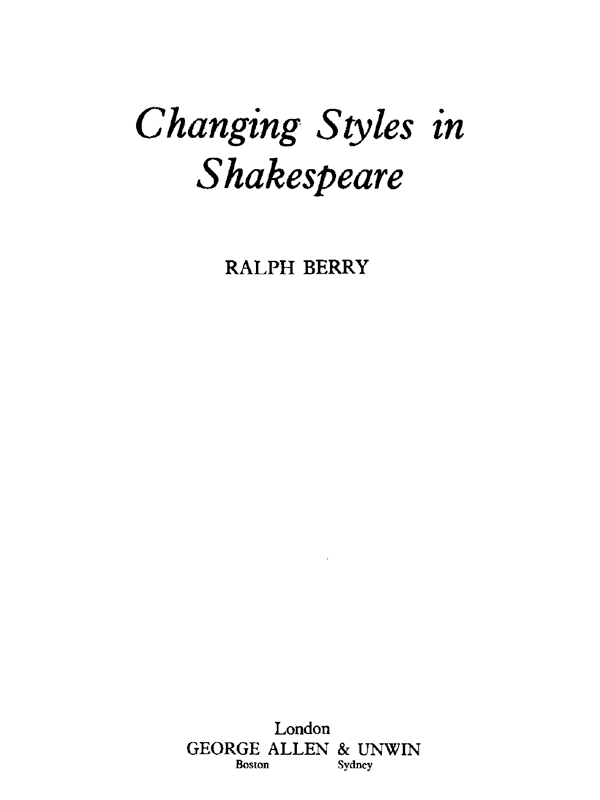
First published in 1981
This book is copyright under the Berne Convention. All rights are reserved. Apart from any fair dealing for the purpose of private study, research, criticism or review, as permitted under the Copyright Act, 1956, no part of this publication may be reproduced, stored in a retrieval system, or transmitted, in any form or by any means, electronic, electrical, chemical, mechanical, optical, photocopying, recording or otherwise, without the prior permission of the copyright owner. Enquiries should be sent to the publishers at the undermentioned address:
GEORGE ALLEN & UNWIN LTD
40 Museum Street, London WC1A 1LU
George Allen & Unwin (Publishers) Ltd, 1981
British Library Cataloguing in Publication Data
Berry, Ralph
Changing styles in Shakespeare.
1. Shakespeare, William Stage history
I. Title
792.9 PR3091
ISBN 0-04-822042-6
Set in 10 on 11 point Plantin by Alan Sutton, Gloucester
and printed in Great Britain
by A. Wheaton & Co., Exeter.
For Frances
I am glad to acknowledge the help given by the Canada Council, which granted me a Leave Fellowship to work on this project. Portions of this book have appeared in New York Literary Forum, Humanities Association Review and Shakespeare Quarterly: I am indebted to the editors of those journals for permission to reprint. And finally I should like to acknowledge the courtesy and help given to me by Miss Molly Sole, Clerk to the Governors of the Old Vic and by the librarians of the Shakespeare Centre Library and the Folger Shakespeare Library.
This book is a study of some ways in which Shakespeare has changed on the contemporary stage, in essence in England. It is not a work of stage history: that implies a fullness of commitment to the past, and to all matters that the stage embraces, that I cannot pretend to. Nor is it devoted to the Shakespeare canon as a whole an impossibly wide undertaking. Nor, even within the limits of a few plays, can it hope to cover all the major productions within a single national frontier. Selectivity is imposed upon me by the nature of the inquiry. My focus is on the contemporary stage, in England, and my aim is to describe something for which the stage is a working model: our changing perception of Shakespeare, and the ways in which we have refashioned Shakespeare after our own image.
Shakespeare changes incessantly, for the sufficient reason that we change. His texts contain more information than those of any other dramatist, and are infinitely susceptible to reinterpretation. In choosing one of his dramas, a director reanimates it with the spirit of his own society and day. In addition to his personal vision, he will identify some current social assumptions and preoccupations in his production. He has no choice. So the history of Shakespearean productions is always a guide of sorts to the times. But this banal statement is true of all plays, in all eras. And not all of Shakespeares plays pose equally interesting challenges. One could meditate profitably on the scene from The Two Gentlemen of Verona that Holman Hunt painted, and compare it with its descendant on todays stage. One could relate the gestures of Garricks Richard III, as painted by William Hogarth, to Oliviers. Something of value is always to be gleaned from these transformations of cultural history. Still, I have preferred to concentrate on those plays which seem to me to offer a sharper and more intense challenge, and especially those plays whose provisional meaning has shifted very noticeably of late years.
For not all plays change greatly. If we could converse with a mid-Victorian playgoer about his and our Macbeth, there would be no great problem of discourse. He would be interested to find our Lady Macbeths younger, more attractive. We could converse But, differences of idiom aside, there would be no doubt that we were discussing the same play. Macbeth is the story of a basically moral human being, who commits an atrocious crime to further his ambitions, and is destroyed by the Fates and his own conscience. Nothing can change that fundamental proposition, that statement of the plays basic nature. And I dare say that our mid-Victorian would share, broadly, our sense of Richard III, or Julius Caesar, or Loves Labours Lost. But with other texts the gulf in approach would widen. How could we discuss Coriolanus, if that play is held to be about a noble though somewhat stiff-necked Roman rightly rebuking the mob for unworthy behaviour? How discuss Henry V, if it is nothing but a celebration of a deserved triumph over the French? As for Measure for Measure, I can scarcely conceive of a dialogue here. Todays adverse treatment of the Duke would seem a perversity, almost a blasphemy, to our Victorian. He would have serious difficulties in concluding that we were discussing the same play.
Next pageFont size:
Interval:
Bookmark:
Similar books «Changing Styles in Shakespeare»
Look at similar books to Changing Styles in Shakespeare. We have selected literature similar in name and meaning in the hope of providing readers with more options to find new, interesting, not yet read works.
Discussion, reviews of the book Changing Styles in Shakespeare and just readers' own opinions. Leave your comments, write what you think about the work, its meaning or the main characters. Specify what exactly you liked and what you didn't like, and why you think so.








